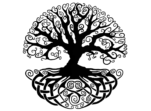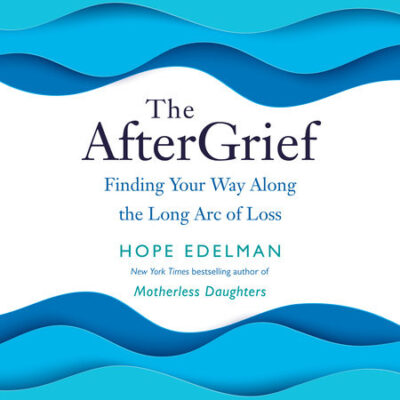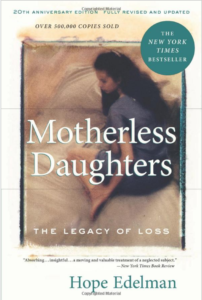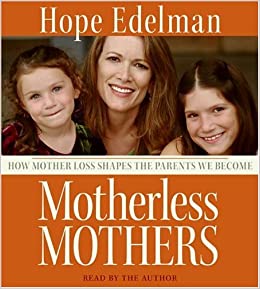Grief: A Natural Response to a Serious Loss
In Hope Edelman‘s latest book, The AfterGrief, Finding Your Way Along the Long Arc of Loss, to be released on October 6th, 2020, she offers “profound advice for reassessing loss and adjusting the stories we tell ourselves about its impact on our identities. With guidance for reframing a story of loss, finding equilibrium within it, and even experiencing renewed growth and purpose in its wake, she demonstrates that though grief is a lifelong process, it doesn’t have to be a lifelong struggle.” (from Amazon.com). Hope is also the author of seven other books, including a memoir.
I have history with Hope.
I don’t know her personally, and regrettably I haven’t yet attended one of her Motherless Daughters retreats conducted with another of my grief-and-loss heroes, Claire Bidwell Smith.
But let me explain. Here’s a passage from my life, loss, and inspiration page that details how I first learned about Hope and her work:
In 1994, I was a returning college student and the mother of three. Driving the hour home one afternoon and listening to WAMC, our local NPR affiliate, I heard about a new book, Motherless Daughters, written by Hope Edelman. When I arrived in our small upstate New York village, I drove directly to the independent bookstore, bought it, and, through tears, devoured it, finding myself on every page, even in stories of loss that were vastly different from my own.
In my 60s now, I’m aware that being without a mother is not as unusual as it was when I was 12, or 20, or even 39, when I first discovered this book. Yet there is a thread that ties us all together, those of us who have experienced motherloss. Hope Edelman has woven this unifying thread through this book and her subsequent volumes, Letters from Motherless Daughters and Motherless Mothers, among others, gifts to all of us who have had to say goodbye to our mothers, especially far sooner than most.
Losing both parents within a year before I reached my teens set me apart from every person I knew—
child or adult—in a way that made me feel separate. Different. I remember thinking, in the years that followed, about how there seemed to be support groups for everything…alcoholics, children of alcoholics, children whose parents were divorced…but there was nothing for a kid whose entire family had left her.
Yes, I still had my big brother, but because he lived far from me, I saw him yearly at most. Living with relatives in another state, people who cared for me but had not the first idea how to comfort or support a grieving child (as few did in the 1960s), I quickly understood I’d need to figure things out on my own.
In 1975, my brother died. I was 20, newly married. I grieved…or so I thought…then pushed ahead into the life I was determined to build for myself.
I had three children, never forgetting the family I’d lost, never losing sight of the family I intended to mother in the way I hadn’t been mothered since I was 12.
Then my own son, Eric, died, himself only 20.
I had a choice then, really the same choice I’d made every day since my father died, the first time I knew what it meant to say goodbye to someone you love for the rest of your life. Would this life of grief become my identity, or would I push on to find meaning in losses?
Hope’s new book moves beyond discussing motherloss to all types of loss (though she explains that childloss has many of its own issues so isn’t addressed specifically).
I’ve participated in a couple of zoom calls with Hope in recent weeks. In one she was joined by Allison Gilbert, in another by Rebecca Soffer (more on each of these women later). So much of what I’ve heard has set off bells for me.
YES! I wrote as I took notes. That was SO true for me.
YES! I’ve said that very thing for years…for the 54 years since my father died, the 53 years since my mother died, the 45 since my brother passed, and the more than 21 since I last saw my son.
I want to share some of these things with you.
In this first post in a series, we’ll talk about society’s penchant for overpathologizing grief.

Grief groups and grief therapy can be lifesavers at times...
but that doesn’t mean everyone needs to see a therapist or join a group. We each grieve in our own way.
What’s more, grief is a normal part of life. Yet society often “overpathologizes” grief and in doing so makes us feel like there is indeed something wrong, something we need to fix. Of course, we want to fix it, to get through the intense pain to the other side. Still, we are moving through a very necessary passage.
So while choosing therapy can be a helpful and viable and sometimes necessary option for those in the early, or even later, stages of grief, we don’t all need to seek counseling. More importantly, no one should be shamed for either selecting or not selecting that option.
When Eric died, I’d already had years of experience with grief. I had both a strong spiritual foundation and a few close friends who supported me, listening whenever I needed to talk. My story was a long and circuitous one (hence, the memoir), but because of the road I’d walked leading up to that day, joining a bereavement group for parents just didn’t feel like the right choice for me.
A year or so later, when I touched base by phone with a therapist I’d seen a couple of years earlier, she asked how I’d gotten through the intense grief that follows the loss of a child. I told her I’d chosen not to begin therapy, and she was stunned, then admonishing.
“What? No!,” she said, a little too forcefully. “You need to be in counseling.”
I was shocked at her response. I’d shared how I’d found peace in the year since Eric’s death and how, though I missed him terribly, I was able to feel joy again. She appeared to have a hard time accepting that I could have gotten there without professional help.
We're all on our own journey to the same destinaton, each of us walking a different path.
What we all seek is peace, a way to find meaning in the loss and in what we choose to do in the life that follows it.
As a dear friend has often reminded me: There is more than one right answer.
Sometimes in the brain fog of loss, we’re bombarded with advice, often from those who love us most. The answer often lies not in weighing the merits of the options. It’s found in determining which option matches the truth of who we are at that moment.
In the end, that answer can only be found within ourselves.
As Glennon Doyle reminds us, “When we quit abandoning ourselves and instead abandon the world’s expectations of us, we become women who can finally look at our lives and recognize: There she is.“
For me, it was the conviction that I was so much more than the orphan, the surviving sister, the mother of the boy who died. I was a woman with a history, filled with both sorrow and joy—the “full catastrophe” of life.
I was a woman with Hope.





Casey that is so beautiful and poignant and just what I needed to hear today as I go through a slow journey of losing my mother.
Oh, Linda, I’m so very sorry to hear this. These losses are inevitable but painful regardless. I highly recommend both this latest book (not that I’ve read it…it isn’t out yet…but I’ve heard so much about it that makes me anxious to have it in my hands) and Motherless Daughters…or maybe even Letters From Motherless Daughters, as there are letters from daughters of all ages that might resonate with your experience. Wishing her a peaceful passage and you much peace.
Oh Casey, I will never forget the GRACE with which you faced Eric’s death. Learning to deal with such a string of losses since a very young age had prepared you for that moment. And you had built a solid spiritual foundation that allowed you to accept the Grace. I love your writing. Keep it coming!
With love, dana
Casey,
Your writing is so descriptive and beautiful. You are an incredible person to share your life experiences with others. ❤
Amy Moyer
Another deeply moving piece, my friend, and it brings forth the idea that you can grieve and still experience joy, and not feel guilt for the joyfulness. Thank you once again…
Somehow I’d missed this when you wrote it, Suzanne. Grief and joy go hand in hand, really, don’t they. Thanks so much as always for reading. XO